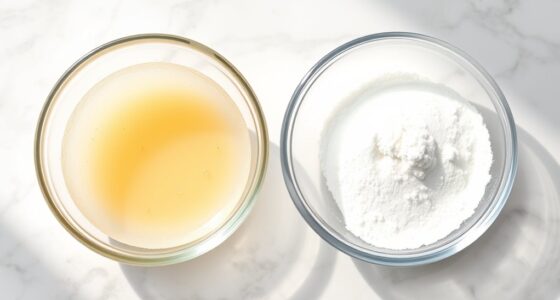To craft authentic Lebanese za’atar, focus on balancing thyme, sumac, and toasted sesame seeds—generally more thyme than sumac, with sesame adding richness. Lightly toast sesame seeds until golden and herbs just until fragrant to enhance flavor. Adjust herb ratios gradually to suit your taste, ensuring a harmonious blend. Perfecting this involves care and patience, and you’ll discover more tips to fine-tune your za’atar as you continue exploring the process.
Key Takeaways
- Use fresh or dried thyme as the flavor backbone, balancing with oregano or marjoram for depth.
- Toast sesame seeds in a dry skillet until golden, stirring constantly to enhance nutty aroma.
- Lightly toast dried herbs like thyme or oregano until fragrant to bring out their essential oils.
- Adjust herb ratios gradually to achieve a harmonious, balanced flavor profile.
- Store ingredients properly and incorporate toasted elements immediately for authentic, rich za’atar.

Lebanese za’atar is more than just a spice blend; it’s a treasured tradition that captures the flavors and culture of the region. When you’re crafting your own, understanding the art of herb blending is essential. The key lies in balancing ingredients like thyme, sumac, and sesame seeds to create a harmonious flavor profile. Typically, fresh or dried thyme forms the backbone of the blend, providing a fragrant, earthy note. You might also include oregano or marjoram for added depth. The ratio of herbs is vital—too much thyme can overpower the subtle tang of sumac, which adds a bright, citrusy acidity. Sesame seeds, toasted to bring out their nutty aroma, add texture and richness. When you’re mixing your herbs, aim for a steady hand, gradually adjusting the ratios until you find that perfect balance that resonates with your taste buds. Remember, traditional za’atar usually emphasizes thyme, but feel free to experiment within reason.
Additionally, understanding the importance of herb-toasting techniques can significantly enhance the final flavor profile. Toasting sesame seeds before mixing them into your blend is a must; it enhances their nuttiness and adds a warm, toasty aroma that’s irresistible. Use a dry skillet over medium heat, stirring constantly to prevent burning. Once the seeds turn golden and release a fragrant aroma, transfer them to a bowl to cool. This simple step makes a noticeable difference in the overall depth of your za’atar. Similarly, lightly toasting your herbs can deepen their flavor, but be cautious not to overdo it—herbs can burn quickly and turn bitter. Toasting dried thyme or oregano briefly in the same skillet, just until they smell fragrant, can bring out their essential oils and intensify their aroma. The goal is to bring out the natural oils and enhance their aroma without losing the fresh, vibrant qualities of the herbs. Incorporate these toasted ingredients into your herb blending process immediately, so the flavors meld seamlessly. Proper toasting techniques are an essential part of creating authentic Lebanese za’atar. Keeping your ingredients fresh and well-stored ensures maximum flavor and aroma in your final blend. When you understand the herb ratios and their impact on flavor, you can craft a balanced and authentic za’atar that truly reflects Lebanese tradition. With patience and care, you’ll craft a za’atar that’s rich in flavor, aromatic, and true to its Lebanese roots. This blend isn’t just a seasoning—it’s a reflection of tradition, and your attention to detail honors that heritage in every jar you create.
Frequently Asked Questions
Can I Customize Za’Atar for Different Flavor Profiles?
Absolutely, you can customize za’atar for different flavor profiles by experimenting with herb substitution. If you prefer a milder taste, swap out some thyme for oregano, or add extra sumac for a tangy boost. To enhance flavor, consider toasting your herbs lightly before mixing, which brings out deeper notes. Feel free to adjust the ratios based on your palate, creating a personalized blend that suits your taste preferences perfectly.
How Long Does Homemade Za’Atar Stay Fresh?
Ever wondered how long your homemade za’atar stays vibrant? Typically, proper storage extends freshness for about 3 to 6 months. To preserve its flavor, keep it in an airtight container away from heat and light. Do you want your za’atar to taste as fresh as the day you made it? Regularly check for aroma and color changes to guarantee ideal storage duration and freshness preservation.
Are There Regional Variations of Lebanese Za’Atar?
You’ll find regional variations of Lebanese za’atar, each reflecting local herbs and culinary traditions. For example, in some areas, thyme dominates, while others blend sumac or sesame seeds differently. These culinary variations give each version a unique flavor profile, showcasing regional herbs’ influence. Exploring these differences lets you enjoy a diverse range of za’atar styles, making your homemade blend even more authentic and tailored to specific Lebanese traditions.
What Are Common Mistakes to Avoid When Toasting Herbs?
Think of toasting herbs as dancing with fire—you need rhythm and caution. Avoid over-toasting, which can turn herbs bitter, and under-toasting, leaving them dull. Focus on herb freshness; fresh herbs toast evenly and release vibrant flavors. Keep an eye on the toasting duration, turning herbs at the right moment. A misstep could dull your za’atar’s bright character, so stay attentive and gentle—your herbs will thank you.
Can I Use Alternative Herbs in Za’Atar Recipes?
You can definitely try herb substitution in your za’atar to customize flavors to your liking. While traditional za’atar uses thyme, oregano, or sumac, feel free to experiment with herbs like marjoram or basil for a different twist. Just keep in mind that changing herbs will alter the flavor profile, so start with small amounts and adjust to suit your taste. This way, you create a unique, personalized za’atar blend.
Conclusion
Now that you’ve revealed the secrets to perfect Lebanese za’atar, your kitchen will never be the same. Every sprinkle will transport you straight to a bustling Lebanese market, where the aroma alone could wake the dead! Master the herb ratios, toast to perfection, and watch as friends and family are utterly captivated by your culinary genius. Get ready to elevate your snacks to legendary status—your za’atar will become the stuff of legends!









